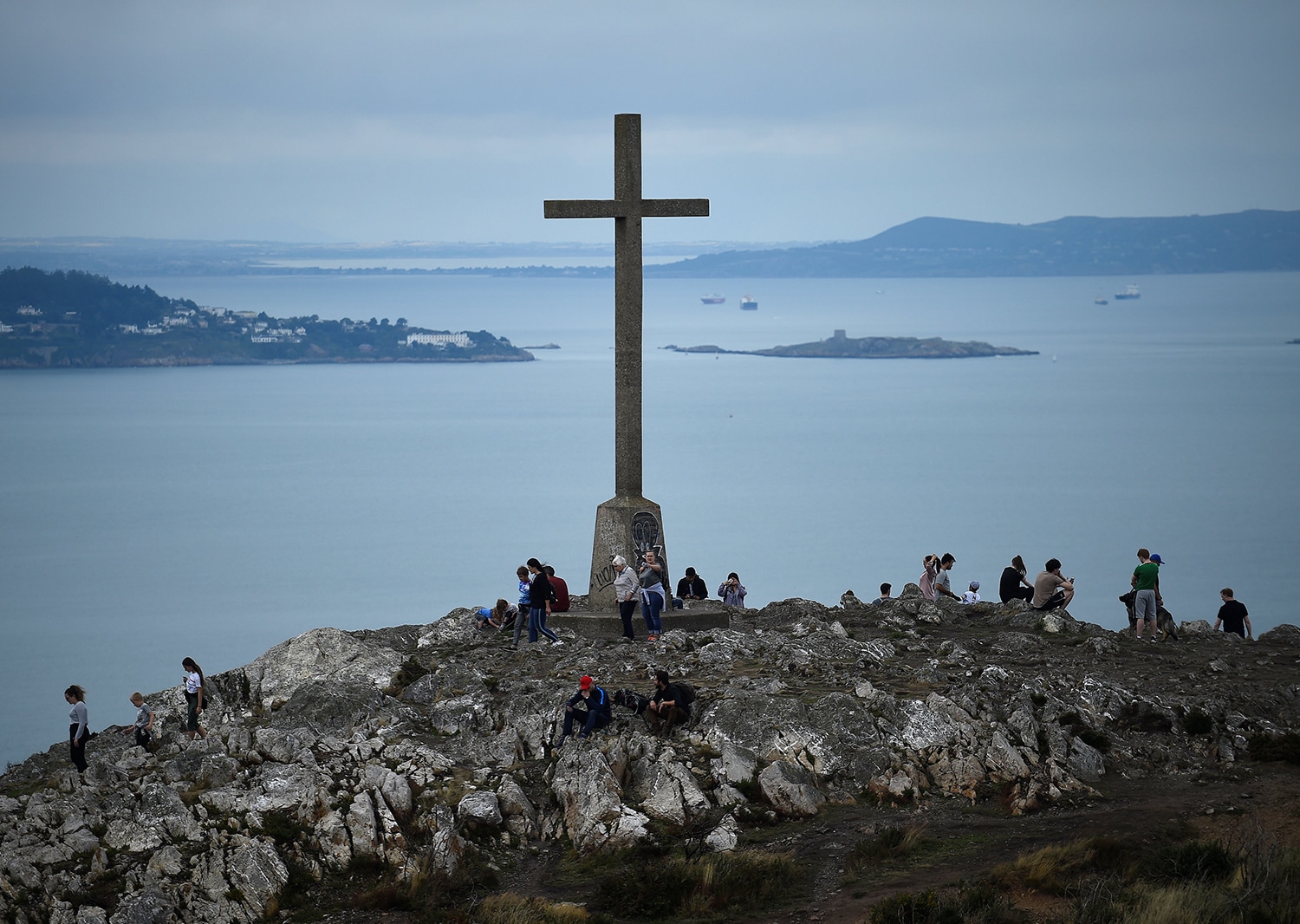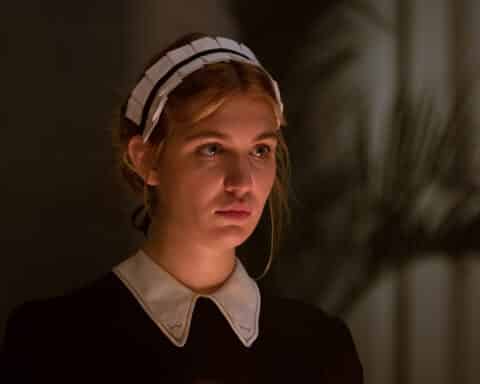(OSV News) — The arrival of St. Patrick’s Day always spotlights Irish culture, music, dance and language. Catholics, too, are involved in Irish cultural efforts on both sides of the Atlantic, and some say Irish culture continues to be a foundation for Catholic evangelization amid the trappings of secular celebration.
Connie Marshner, president of the Front Royal, Virginia-based Saints and Scholars Foundation, objected that some American presentations of St. Patrick’s Day focus on “the green beer and plastic leprechaun kind of Irish, which is total commercial nonsense.”
“Remember that it’s a religious feast, not just an excuse to go out and have a party and drink too much,” Marshner told OSV News. Her organization aims to foster American support for classical Catholic education models in Ireland, with theology, philosophy and Latin taught alongside Irish language, culture, history and sports.
She is far from the only Irish-American Catholic involved in promoting Irish culture.
‘More than parades and leprechauns’
There also are the volunteers who run the Trenton, New Jersey-area Gael Scoil. The two-day annual program, now in its 17th year, provides Irish culture lessons to children ages 6 to 17. The school aims to show that Ireland is “more than parades and leprechauns,” according to its website. Lesson topics include Irish history, language, music, dance and sports, taught by local historians, musicians, dancers, athletes and other experts.
The Gael Scoil’s YouTube videos discuss the life of St. Patrick. The fifth-century Briton was enslaved and held captive in Ireland, only to escape and return as its most famous Christian missionary — one who would completely identify with the Irish people he came to evangelize.
The most recent Gael Scoil, held Feb. 17-18 at Notre Dame High School in Lawrenceville, New Jersey, drew scores of participants. The program is sponsored by the Ancient Order of Hibernians Division 10 in Mercer County. The AOH, a national organization for Irish-American Catholic men, has tens of thousands of members around the country. The national AOH leadership seeks to promote a starter version of the program so that local divisions may adopt the program for their communities.
Sean Pender, AOH national vice president, told OSV News the organization is the largest Irish organization outside of Ireland and has members in all 50 U.S. states. It was founded in 1836 “to help protect the Catholic Church and Irish immigrants,” Pender said. Its purposes today include promoting the Catholic faith as well as Irish heritage, history and traditions.
“In order to accomplish this, we need to make sure that we tell the story of the Irish people to our children,” Pender said, praising “the gift of Irish heritage.”
“It’s so important to understand and appreciate where you came from,” he said. “This gift gives you the knowledge of those that came before you, the pride in the accomplishments and sacrifices of those same people.”
A view from Ireland
While Irish-America intentionally seeks out Irish heritage, the context can be different in Ireland.
“It’s possible that Irish-American Catholics, based on my little experience, appreciate the distinctive nature of Irish language and culture more profoundly than Catholics in Ireland do,” Father Conor McDonough, a 37-year-old Dominican priest based in Dublin’s north inner city, told OSV News. “Perhaps we take this for granted. It’s the diaspora that sometimes reminds us of the beauty of our culture.”
In 19th-century Ireland, he noted, Irish culture again became seen as worthy, valuable and noble. This coincided with Catholic emancipation and became closely intertwined with it. There was “shedding of a certain shame” surrounding Irish Catholic identity and broader Catholic identity.
“It showed to Irish people that their own culture produced artifacts of culture that were extraordinary,” he said, citing works like the Book of Kells and the Ardagh Chalice.
Father McDonough is responsible for the online preaching of the Irish Dominicans. Their YouTube channel includes the initial episodes of “Treasure Ireland,” a planned series about Ireland’s Christian heritage from ancient to modern times, drawing on stories from each of the island’s 32 counties.
“I’m very passionate about the whole story of Ireland, especially Irish Christianity,” the priest said. In his view, Irish history and culture has “great potential” for evangelization and re-evangelization.
“What we hope to do in our video series is to show people that the Irish story is woven through with Catholic faith,” he said. “Even for Irish people who are not Catholic believers, this is something that they can come to appreciate, and maybe then reevaluate the Catholic faith on the basis that it is so intertwined with their identity and their story.”
“I’m not claiming that the whole story of Ireland is thoroughly Christian — the ‘Island of Saints and Scholars’ and all that can be exaggerated,” Father McDonough added. “But it’s possible, in a nuanced and truthful way, to tell the history, to tell the story, to appreciate all the elements of our culture in a way that allows the Gospel to be the luminous heart of all of this culture, which is what it was for so long.”
What went wrong with Irish Christianity?
Marshner, the head of the Saints and Scholars Foundation, is hardly uncritical of Irish Catholicism and how it has developed over the centuries.
As she reads Irish history, Ireland’s early Christianity had a “deeply personal nature.” Evangelizing and re-evangelizing through Ireland’s gifts involves reconnecting with — and drawing from — Ireland’s ancient Christian taproot.
“The Gaelic emphasis is ‘the High King of Heaven wants me to join him,'” she said. “It’s an aspiration and it’s intimacy — with him — and the desire to please him and to follow him and to avoid sin.”
At the same time, Marshner said the recovery of historic Irish Catholicism would depart from the “very legalistic” views of more recent centuries. The removal of legal penalties against Irish Catholicism in the early 19th century, in her view, did not lead to a revival of Ireland’s old Catholicism but rather joined Catholic doctrine to a “desiccated post-Puritan Victorian spirituality” under British, anglicizing influence.
Marshner holds a master’s in Gaelic literature from Ireland’s University College Cork, earned online during the COVID-19 pandemic. She is working to achieve fluency in the Irish language and has a particular interest in early Egyptian Christianity’s influence on Ireland.
In recent decades, she noted, Irish Catholicism has suffered “horrendous scandals” of clergy abuse and institutional misconduct in many ways worse than those seen in the U.S. Despite this, there are still relatively high levels of Catholic self-identification. About 69% of residents of the Republic of Ireland identify as Catholic, according to the 2022 census overseen by Ireland’s Central Statistics Office.
“The faith is not dead. It’s just hiding,” Marshner said. “It’s just waiting for a new infusion of young blood that will understand the faith and be able to defend it, motivated not by fear of the priest, but by the love of Jesus Christ.”
In her view, Catholic education in 19th- and 20th-century Ireland suffered from “a dearth of Catholic intellectualism.” Catholic instruction often stopped with catechism in elementary school and lacked the resources of the U.S., where Catholic high schools and colleges taught theology and philosophy to a broader section of students.
Catholic classical education comes to Ireland
Marshner’s Saints and Scholars Foundation aims to aid classical academy models and classical home-schooling programs in an Irish context. Though such programs have seen decades of growth in the U.S., they are new in Ireland.
The foundation’s major project at present is support for Mater Dei Academy, a lay Catholic-run secondary school based in the southeast Irish city of Cork. The school, founded in 2020, now has over 40 students, and its course offerings include an Irish language curriculum alongside Latin, liberal arts, and science.
Students are taught not only Catholic doctrine, said Marshner. “They’re invited to experience Christ deeply. Every day begins with sung morning prayer, and every school day ends with a restored version of vespers,” she said.
Combined with weekly Mass, Marshner added, the school has “an atmosphere of deep personal Catholicism and a classical curriculum.” It aims for a deeper education that inspires students to learn more. Mater Dei is not just for the wealthy and does not charge tuition beyond what parents can pay. It has no state support but relies on benefactors.
Several other schools in Ireland have launched an elementary-level program modeled on Mater Dei Academy. Mater Dei also has a home-school program, which, according to Marshner, is the only home-school program that offers Irish history, language and culture.
“For any American who has a heart for Ireland, you could really make a difference and help restore the faith,” she said, appealing for more support. She noted the legacy of Irish Americans’ financial and other support for efforts to revive the Irish language and support for Irish independence efforts in the 1910s and 1920s.
A broad, multifaceted context
For his part, Father McDonough warned against any tendency to think of Ireland as “Catholic Ireland” in a way that excludes Protestants’ “immense contributions.” There were many Protestant leaders and participants in the so-called “Celtic Revival” movement of the 19th century, he noted.
Irish and Catholic identity are complicated in the six counties of Northern Ireland, where sectarian and political tensions with Protestants loyal to the United Kingdom have lessened but not disappeared.
“The sectarian context in Northern Ireland has tended to exacerbate a sense of cultural ownership among Catholics, while Protestants reject everything Irish and Gaelic,” McDonough summarized.
However, attitudes are changing. Father McDonough pointed to the unprecedented March 6 visit to a Gaelic athletic club by Northern Ireland Deputy First Minister Emma Little-Pengelly, a member of the historically Protestant Democratic Unionist Party. She practiced scoring in camogie, the women’s equivalent of hurling, an ancient Gaelic outdoor game played by men.
Father McDonough said this is “symbolically a very significant thing.” In heavily Protestant East Belfast, he noted, some movements are now seeking to reappropriate Irish language and Gaelic games.
“Those movements can be immensely healing,” he said.
He offered some advice for Catholic advocates of Irish culture: They should base themselves on good scholarship and “not be too romantic or doe-eyed about the past.” They should not “tell too simple a story about Ireland’s past,” he added, but “recognize glory where there is glory, and shame where there is shame; and be responsible in the history that we recount.”
“But it’s just as important also to take great joy in the music, the song, the poetry,” Father McDonough said. Irish culture has a “personal impact,” he said, and it is “a gift” to “simply enjoy these elements of Irish culture rather than as a means to evangelize or a means to politically reconcile.”





